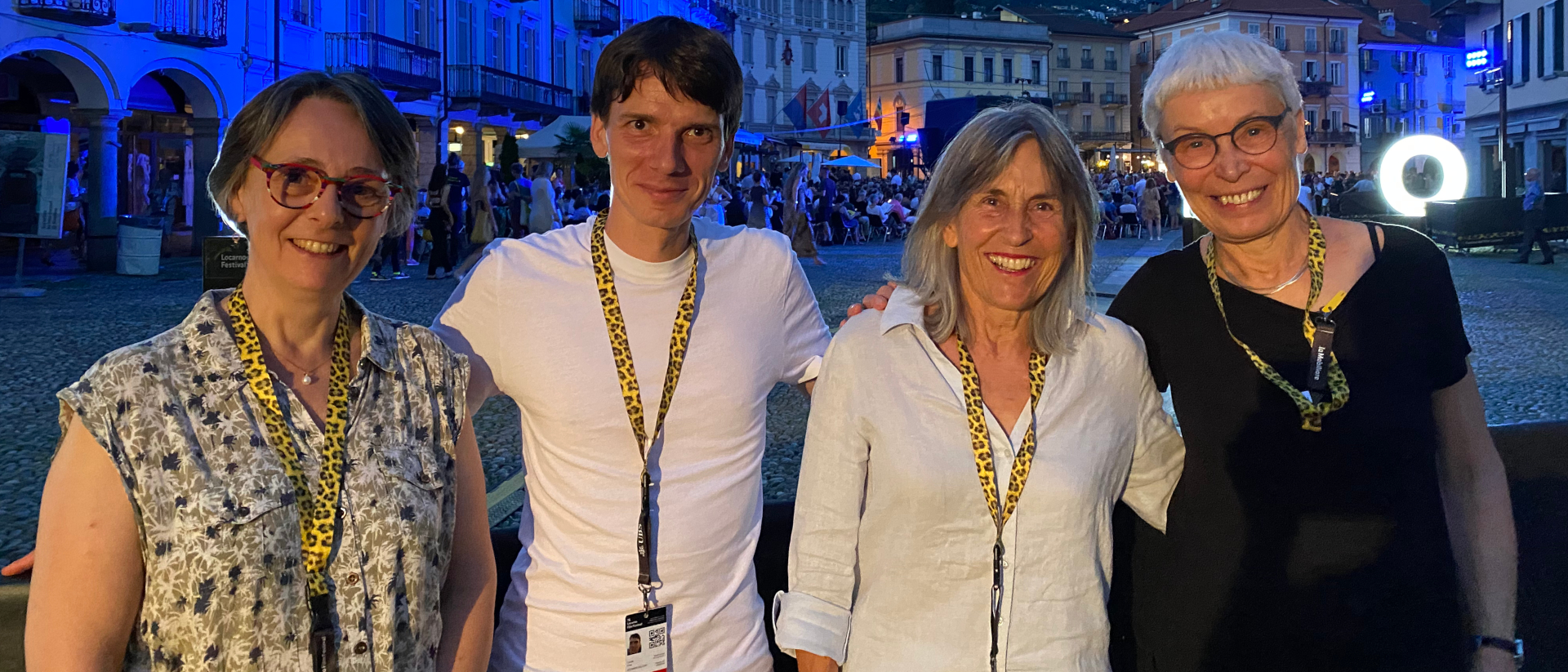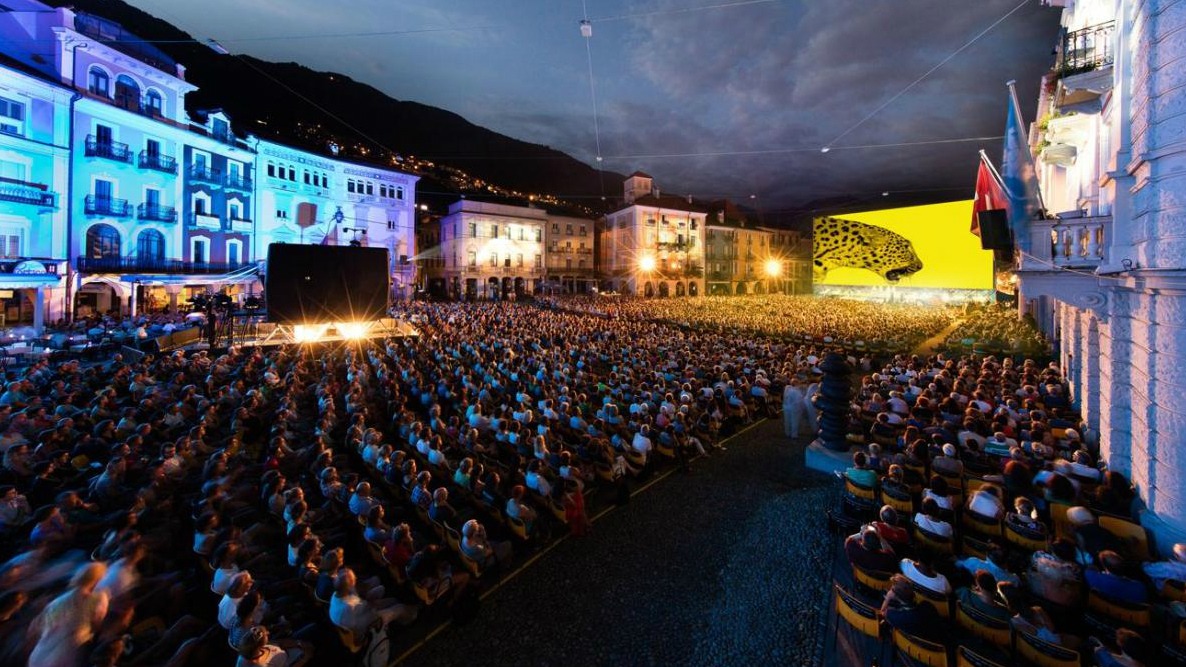On the Piazza Grande in Locarno, Anne-Béatrice Schwab enjoys the summer sun. The Vaudoise, passionate about cinema since her youth, is this year a member of the ecumenical jury of the Locarno Film Festival. “It’s a gift,” she explains before joining a dark room for the next protection.
Raphaël Rauch, kath.ch / translation adaptation Maurice Page
Until her retirement, Anne-Béatrice Schwab worked at the Juvenile Court of the canton of Vaud. “It was exciting work,” she says, “even if it wasn’t always easy. A lawsuit shows what is wrong with our society. Someone got lost, there are dramas. At the same time, a trial is also an opportunity for a new start”. The work of a juvenile judge is “a mixture of law, psychology and social work”.
As a member of the ecumenical jury of Locarno, she now occupies a position of judge of another kind. “You cannot compare the two tasks, at most openness to novelty and curiosity for people.”
Anne-Béatrice Schwab is a cinephile by passion. For twenty years, she was involved with the “Cercle d’Etudes cin- timatiques” in Lausanne and Vevey. She designed and hosted the program there. And she participated in the writing of Cinefeuilles.
For 25 years, she has been a member of the Cantonal Film Control Office of the canton of Vaud and, for seven years, of the National Commission for the Protection of Children and Young People from the Media. On the basis of uniform criteria for the whole of Switzerland, it is a question of determining the legal age and the recommended age for going to the cinema. If a film is particularly violent or contains overly explicit erotic scenes, only adults can see it. If the scenes are more subtle, teenagers can also watch it. “When I think of the possible reactions of my five grandchildren aged seven to thirteen, it helps me to suggest such and such an age”, explains Anne-Béatrice Schwab.
Ecumenism as evidence
Catholic, married to a reformed pastor, Anne-Béatrice Schwab is a member of the jury for the Protestant organization Interfilm. This demonstrates to what extent ecumenism is taken for granted in Locarno.
This Romande fell in love with cinema at the age of 14. She was going to St-Maurice College and saw “The Seventh Seal” by Ingmar Bergman. “For me, this film shows absolute beauty. All simply magnificent”. She then leans to the side, as if the film was unfolding in her head.
Opening horizons – a humanistic and spiritual level
The ecumenical jury of Locarno awards a prize of 20,000 francs “to filmmakers who manage to sensitize their public to religious, human or social values”, according to the official text. And “it questions the visions of the filmmakers on a sense of justice, peace and respect as well as on spiritual dimensions”.
Anne-Béatrice Schwab is delighted to work within the ecumenical jury. Concretely, this means that you should not impose your personal favorite, but “look for a film that is in tune with the majority of people and that opens up new dimensions of meaning to them. A film can be demanding, but not elitist”.
The ecumenical jury pursues a constructive approach: “These are films which give hope, open up horizons and thus underline a humanistic and spiritual level”.
Report abuse
Sometimes, the cinema is also a powerful means of combating and denouncing abuses. Anne-Béatrice Schwab, for example, appreciates the approach of François Ozon in his film “Thanks to God”: “He puts his finger on the problems without passing judgment. He tells without moralizing. It is up to the spectators to make up their minds.
As a former juvenile judge, she is particularly sensitive to abuse within the Catholic Church. “It breaks my heart. When will this finally end? I’ve worked long enough in justice to know that abuse happens in all walks of life and at all times. But the Church has a special responsibility and must play a pioneering role in the work of prevention and information,” she said. “The long silence on these painful subjects and the suffering of the victims” particularly concerns her. “It is precisely when words fail that cinema can make its contribution”. (cath.ch/kath.ch/rr/mp)

Locarno, the churches and the cinema
For the churches, cinema also has a role to play. As recalled on August 7, Rita Famos, president of the Evangelical Reformed Church of Switzerland. during the ecumenical celebration of the Locarno Film Festival: “The spirit of God blows where it wills, even in the films”. A clear address to the attention of the ecumenical jury.
The Catholic and Protestant Churches have two bodies dedicated to cinema. Signis, formerly OCIC, International Catholic Film Organization, has since 1928 brought together radio, television, film and new technology professionals in more than a hundred countries. Its reformed counterpartInterfilmwas founded in 1955 by Protestant film associations in Europe.
Its members are mainly Protestant, but also Orthodox, Anglican and Jewish.
These two organizations propose professionals to compose the ecumenical juries of the festivals which make a place for the Churches. Signis has ecumenical juries at more than 30 international festivals. As for Interfilmin addition to Berlin, Cannes and Venice, it is represented in many other festivals such as Montreal, Yerevan or Locarno, precisely where the first ecumenical jury was created in 1973.
The goal for ecumenical juries is to foster a culture of peace, in the light of the Gospel by promoting human dignity, justice and reconciliation. These two associations also act together, as last July, when they protested against the arrest of three Iranian directors. This year the ecumenical jury of Locarno has four people: in addition to the Vaudoise Anne-Béatrice Schwab, the French Anne Dagallier, the German Linde Fröhlich, and finally the Czech Lukáš Jirsa. All of them have solid experience in the field of cinema and festivals. CP–MP
© Catholic Media Center Cath-Info, 11.08.2022
The rights to all content on this site are registered with Cath-Info. Any distribution of text, sound or image on any medium whatsoever is chargeable. Registration in other databases is prohibited.
Locarno Film Festival: “A film can be demanding, but not elitist” – Swiss Catholic Portal

